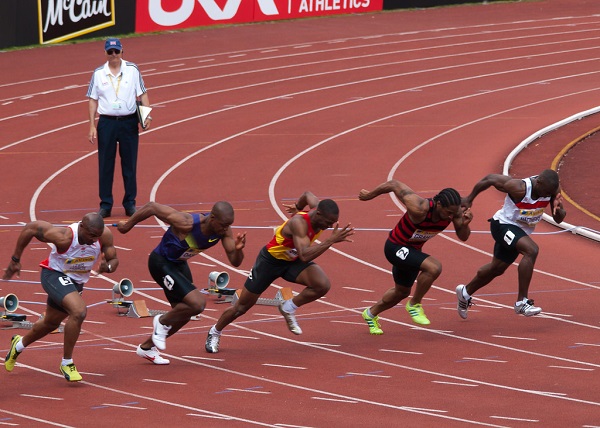Prediction of reaction speed from pre-movement brain activity Fast or slow reaction is already decided before go signal


Prediction of variability in reaction time to go signal from brain activity
This research demonstrated that it is possible to predict variability in the time between the go signal and the actual initiation of movement (fast or slow reaction time) using pre-movement brain activity.
Credit: CC BY 2.0 William Warby
Researchers at the University of Tokyo have demonstrated that pre-movement neural activity contains information which enables prediction of trial-by-trial variability in reaction times. Their results are expected to lead to the development of novel training methods to achieve less variable motor performance in sports activities.
Usain Bolt makes great records in the 100 meters. But no sprinter, not even Bolt, can make a perfect start in every race. Our reactions are inevitably variable even when performing the same movement over and over again. Variability in motor output is generally assumed to arise due to online noise at the neuromuscular junctions, where nerves and voluntary muscles meet. Although recent neurophysiological research with monkeys suggests that neural activity during the motor preparation stage before movement is one possible source of such variability, it is still unclear whether neural signals measured from human brains reflect the information which enables prediction of variability in reaction time.
Japan Society for the Promotion of Science Research Fellow Ryu Ohata and Professor Hiroshi Imamizu at the University of Tokyo Graduate School of Humanities and Sociology and Associate Professor Kenji Ogawa at Hokkaido University successfully predicted whether human subjects would respond after a short or long reaction time before movement from their brain activity recorded by magnetoencephalography (MEG). MEG is able to record human brain activity with a high temporal resolution of milliseconds. The research group were able to make this prediction by identifying the activity pattern which reflects difference in reaction times using a machine learning algorithm. When using the activity in the premotor cortex, which is related to the function of motor preparation, they succeeded in predicting variability in reaction times about 0.5 seconds before the go-signal onset.
This result indicates that preparatory state of the brain has great impact on the subsequent motor performance. Therefore, if we can train our brains to produce an appropriate preparatory state, it may be possible to perform movements constantly with less variability or prevent delayed reactions that may lead to serious human errors such as traffic accidents.
“Professional sprinters practice their starts thousands or tens of thousands of times to improve their reactions to the gun and improve their times by a hundredth of a second. This implies that such repeated practice is thought to be the best practice for suppressing variability in reaction times,” says Ohata. He continues, “Our results are a major contribution to developing a real time system to monitor the preparatory state of the brain. Developing such a monitoring system is expected to lead to effective training methods which enable athletes to make the best start with fewer practice sessions.”
Paper
, "Single-trial prediction of reaction time variability from MEG brain activity", Scientific Reports: 2016/06/03 (Japan time), doi: 10.1038/srep27416.
Article link (Publication, UTokyo Repository)
Links
Graduate School of Humanities and Sociology
Department of Psychology, Division of General Culture, Graduate School of Humanities and Sociology
Advanced Telecommunications Research Institute International
Laboratory of Kenji Ogawa, Department of Psychology, Graduate School of Letters, Hokkaido University






